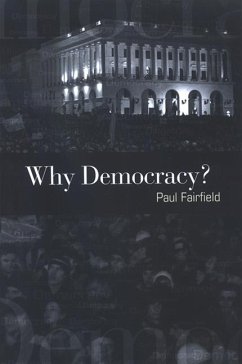While much of the world now embraces the democratic idea-that the people must rule-the philosophical case for democracy has yet to be made convincingly. Why Democracy? not only reexamines the current debates in normative democratic theory, but also challenges popular conceptions that tend toward an uncritical idealization of popular rule. It is not enough to call for more extensive public deliberation, or for greater participation and inclusion in the democratic process, or for a radical extension of the scope of the process. Making the case for democracy requires examining its imaginative and rhetorical dimensions as well. The democratic idea of "rule by the people" must be understood less as a definition than as an aspiration, a trope, and the beginning of a narrative that includes, while extending beyond, the domain of government.
Dieser Download kann aus rechtlichen Gründen nur mit Rechnungsadresse in A, D ausgeliefert werden.


